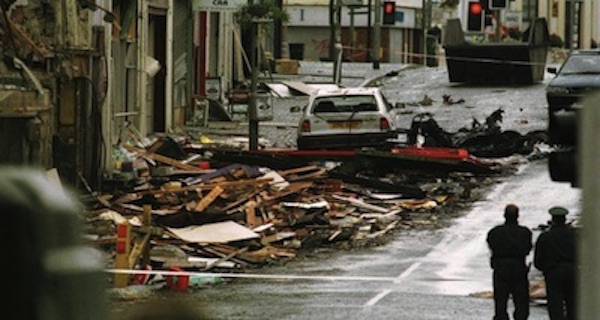
The British government has said it will “take time” to consider its options after a judge called for an inquiry into state actions in connection with a bomb which was allowed to detonate on a street in Omagh, County Tyrone in August 1998, killing 29 people.
The Omagh bomb was tracked by state forces on both sides of the border to its destination, but was allowed to detonate on a busy street for reasons which remain the subject of intense controversy and speculation.
A woman pregnant with twins and two Spanish nationals were among those who lost their lives.
After years of delaying tactics, both the London and Dublin governments are under renewed pressure to set up public inquiries into the bomb after a Belfast High Court judge admitted that the attack ‘could have been prevented’.
Following a judicial review, Justice Horner found against the British government on Friday over its refusal to order a public inquiry.
The attack targeted commercial buildings in the centre of the market town in the aftermath of the Provisional IRA’s peace deal with the British government. It followed similar bomb missions by the ‘Real IRA’ in other towns which resulted in no casualties.
But allegations have continued since 1998 that the loss of life in the predominately nationalist town may have been engineered by state forces to wreck support for the breakaway armed group.
Despite several advance telephone bomb warnings, the area around the Omagh device was not cleared, creating the worst single tragedy of the entire conflict.
Details of Britain’s foreknowledge of the attack remain subject to the strongest secrecy orders, including all details of the tracking of the device and the level of surveillance and infiltration of the group involved.
While having no jurisdiction to order the Dublin government, the judge also urged authorities in the 26 Counties to establish their own probe. Gardai police have refused to reveal their knowledge of the attack or the vehicle involved, despite reportedly being aware of its procurement and its movements until it reached the border.
Eight years ago, Michael Gallagher, whose son Aiden was killed in the blast, launched a judicial review against the cover-up.
Delivering the conclusions to the long-delayed judgment in Belfast High Court, the judge delivered only a brief statement. Details of the judgement are also subject to state secrecy measures, with a redacted version to be released at a later date.
However, the judge confirmed the Crown forces were aware of Real IRA activity on both sides of the border leading up to the Omagh attack and said there was a “real prospect” of the state preventing the loss of life.
“I am therefore satisfied that the threshold under Article 2 ECHR (European Convention on Human Rights) to require the investigation of those allegations has been reached,” he said.
A previous investigation by former police ombudsman Baroness Nuala O’Loan called for a public inquiry after she also concluded the bomb “could have been prevented”, but her appeal was rejected by the British government.
The judge fully backed O’Loan’s conclusions but stopped short of ordering a public inquiry, explaining he did not want to be “prescriptive” about the methodology.
He also said he did not have the powers to order the authorities in the 26 Counties to act, but he expressed hope the government in Dublin would end its refusal to investigate the role of Gardai in the case.
British Direct Ruler Brandon Lewis said the Tories will “take time to consider the judge’s statement and all its recommendations carefully as we wait for the full judgment to be published.” The 26 County Taoiseach Micheál Martin said his government will “examine all the options” and then do what is “necessary”.
A vindicated Mr Gallagher described the ruling as “absolutely amazing”. He said a public inquiry is the only form of investigation that could answer the questions around Omagh.
He launched his action against then British Direct Ruler Theresa Villiers after she declined to order a public inquiry in 2013.
“We hope today is the beginning of the end, not the end,” he said. “This is a huge step forward for justice and for the Omagh families.”
Stanley McCombe, whose wife, Ann, was killed, said the ruling gave the families “some hope”.
“It took some time for it to sink in,” Mr McCombe said.
“We are delighted that the judge has come out and said that there is a possibility of an investigation into the prevention of the bomb.
“It’s fantastic news but we have known this and survived this for the last 20 years.
“The amount of work that myself, Michael and our legal teams (did) in getting to the court, and it is only rightly so that we get an investigation in this.
“This is a step forward. But why has it taken this length of time for us to get the public inquiry?
“What are the British and Irish governments hiding? Why do they not want an inquiry when it is the worst atrocity in Ireland?”
![[Irish Republican News]](https://republican-news.org/graphics/title_gifs/rn.gif)
![[Irish Republican News]](https://republican-news.org/graphics/title_gifs/harp.gif)

